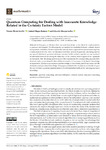Mostrar o rexistro simple do ítem
Quantum Computing for Dealing with Inaccurate Knowledge Related to the Certainty Factors Model
| dc.contributor.author | Moret-Bonillo, Vicente | |
| dc.contributor.author | Magaz Romero, Samuel | |
| dc.contributor.author | Mosqueira-Rey, E. | |
| dc.date.accessioned | 2022-01-18T18:12:08Z | |
| dc.date.available | 2022-01-18T18:12:08Z | |
| dc.date.issued | 2022 | |
| dc.identifier.citation | Moret-Bonillo, V.; Magaz-Romero, S.; Mosqueira-Rey, E. Quantum Computing for Dealing with Inaccurate Knowledge Related to the Certainty Factors Model. Mathematics 2022, 10, 189. https://doi.org/10.3390/math10020189 | es_ES |
| dc.identifier.uri | http://hdl.handle.net/2183/29419 | |
| dc.description | This article belongs to the Special Issue Advances in Quantum Artificial Intelligence and Machine Learning | es_ES |
| dc.description.abstract | [Abstract] In this paper, we illustrate that inaccurate knowledge can be efficiently implemented in a quantum environment. For this purpose, we analyse the correlation between certainty factors and quantum probability. We first explore the certainty factors approach for inexact reasoning from a classical point of view. Next, we introduce some basic aspects of quantum computing, and we pay special attention to quantum rule-based systems. In this context, a specific use case was built: an inferential network for testing the behaviour of the certainty factors approach in a quantum environment. After the design and execution of the experiments, the corresponding analysis of the obtained results was performed in three different scenarios: (1) inaccuracy in declarative knowledge, or imprecision, (2) inaccuracy in procedural knowledge, or uncertainty, and (3) inaccuracy in both declarative and procedural knowledge. This paper, as stated in the conclusions, is intended to pave the way for future quantum implementations of well-established methods for handling inaccurate knowledge. | es_ES |
| dc.description.sponsorship | This work was supported by the European Union’s Horizon 2020 research and innovation programme under project NEASQC (grant agreement No. 951821) and by the Xunta de Galicia (grant ED431C 2018/34) with the European Union ERDF funds. We wish to acknowledge the support received from the Centro de Investigación de Galicia “CITIC”, funded by Xunta de Galicia and the European Union (European Regional Development Fund- Galicia 2014–2020 Program, grant ED431G 2019/01) | es_ES |
| dc.description.sponsorship | Xunta de Galicia; ED431C 2018/34 | es_ES |
| dc.description.sponsorship | Xunta de Galicia; ED431G 2019/01 | |
| dc.language.iso | eng | es_ES |
| dc.publisher | MDPI | es_ES |
| dc.relation | info:eu-repo/grantAgreement/EC/H2020/951821 | es_ES |
| dc.relation.uri | https://doi.org/10.3390/math10020189 | es_ES |
| dc.rights | Atribución 4.0 Internacional | es_ES |
| dc.rights.uri | http://creativecommons.org/licenses/by/4.0/ | * |
| dc.subject | Quantum computing | es_ES |
| dc.subject | Artificial intelligence | es_ES |
| dc.subject | Certainty factors | es_ES |
| dc.subject | Inaccurate reasoning | es_ES |
| dc.subject | Quantum rule-based systems | es_ES |
| dc.title | Quantum Computing for Dealing with Inaccurate Knowledge Related to the Certainty Factors Model | es_ES |
| dc.type | info:eu-repo/semantics/article | es_ES |
| dc.rights.access | info:eu-repo/semantics/openAccess | es_ES |
| UDC.journalTitle | Mathematics | es_ES |
| UDC.volume | 10 | es_ES |
| UDC.issue | 2 | es_ES |
| UDC.startPage | 189 | es_ES |
| dc.identifier.doi | 10.3390/math10020189 |
Ficheiros no ítem
Este ítem aparece na(s) seguinte(s) colección(s)
-
GI-LIDIA - Artigos [61]
-
OpenAIRE [332]






